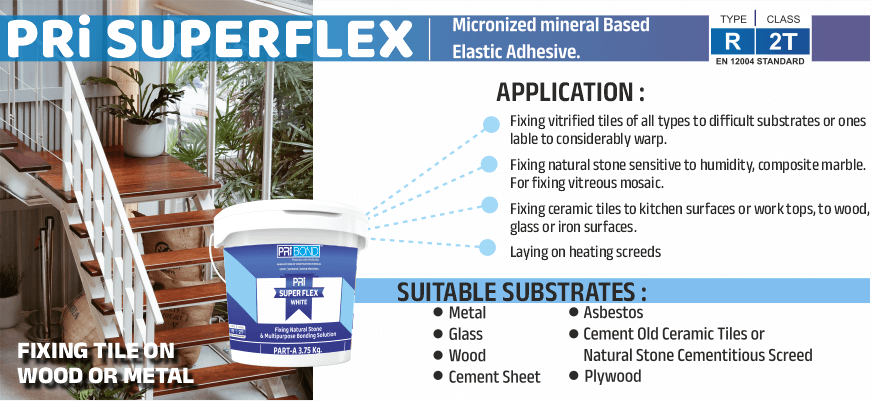
PRi Superflex
PRODUCT STRENGTHS
- Floors and walls, for internal and external use
- Open and adjustability time ≥ 30 min.
- Suitable for vitrified tiles, ceramics, large formats, low thickness slabs and natural stone
- Ideal for marble and natural stone that tends to form stains and sag in the presence of humidity
- Ideal for resin-based engineered stones
- Easy and light to spread thanks to the Light Work technology
recomposed materials also subjected to staining or deformation due to water absorption and thermal expansion
SURFACES:
- mineral screed
- cement-based screeds
- prefabricated concrete or fresh concrete castings
- cement plasters and cement-lime mortar
- floors and walls in polyurethane resin, glazed tiles, cement-based and resin floor tiles, porcelain tiles
- wood, metals, rubber, PVC, linoleum, glass surfaces
Internal and external flooring and walls, in domestic, commercial and industrial applications, for street furniture, under floor heating systems, work surfaces in industrial settings or in laboratories, swimming pools, Turkish baths, thermal water baths and fountains, also in areas subject to freezing. Fixing to sheet metal used for prefabricated bathrooms, on worktops and kitchens, balconies, terraces, flat roofs and domes.
DO NOT USE:
In contact with polystyrene or on substrates which are not fully cured and subjected to moisture rising
PRi SUPERFLEX is prepared by mixing together parts A and B from the bottom upwards, using a low-rev (≈ 400/min.) helicoidally agitator, respecting the present ratio of 1:3 of the packs. Pour part B into the bucket containing part A, being careful to mix the two parts uniformly until a smooth, even coloured mixture is obtained. The user must mix a quantity of adhesive which can be consumed within 1 hour at +23 °C / 50% R.H. Packs of PRi SUPERFLEX must be stored at a temperature of ≈ +20 °C for at least 2/3 days prior to use.
PRi SUPERFLEX must be applied with a suitable, toothed trowel of the type and dimensions most appropriate for the format and type of tiles used. Using the smooth part of the trowel, apply a fine layer of product, pressing down onto the surface in order to ensure maximum adhesion. Press down each tile to allow for maximum coverage of the surface. In environments subjected to heavy traffic, in external applications and wherever high-elasticity fixing system is required, use the double-spread technique to ensure 100% application of the product to the rear of the tiles.
Residues of PRi SUPERFLEX can be cleaned from tools and covered surfaces with water and alcohol while the adhesive is still fresh. Once cured, the adhesive can only be removed by mechanical means.
| Appearance | Part A white paste / Part B white paste | |
| Specific weight | Part A ≈ 750grm Part B ≈ 250grm | |
| Mineralogical nature of inert material | crystalline carbonate | |
| Grading | ≈ 0 – 100 µm | |
| Shelf life | ≈ 24 months in the original packaging | |
| Warning | Protect from frost Avoid direct exposure to sunlight and sources of heat | |
| Pack | monopack 5 kg (750g*5+250g*5) | |
| Mixing ratio | Part A : Part B = 1 : 3 | |
| Viscosity of the mixture | ≈ 750000 mPa · s, rotor 7 RPM 5 Brookfield method | |
| Temperature range for application | from +10 °C to +30 °C | |
| Pot life | ≥ 30 min. | |
| Open time | ≥ 30 min. EN 1346 | |
| Adjustability | ≥ 30 min. | |
| Vertical slip | ≤ 0,5 mm EN 1308 | |
| Foot traffic | ≈ 24 hrs | |
| Grouting | ≈ 12 hrs on walls / ≈ 24 hrs on floors | |
| Interval before normal use | ≈ 3 days | |
| Coverage * | ≈ 1.5 kg/m2 per mm of thickness | |
| Shear adhesion after 7 days | ≥ 4 N/mm2 | |
Durability test: – shear adhesion after water immersion |
≥ 3,5 N/mm2 EN 12003 | |
| – shear adhesion after thermal shock | ≥ 3,5 N/mm2 EN 12003 | |
| Adhesion to concrete after 7 days | ≥ 2.5 N/mm2 (concrete yield) EN 1348 | |
| Vertical slip | ≤ 0,5 mm EN 1308 | |
| Working temperature | from -40 °C to +70 °C | |
Values taken at +23 °C, 50% R.H. and no ventilation. Data may vary depending on specific conditions at the building site, i.e. Temperature, ventilation and absorbency level of the surface and of the materials fixed.
(*) Can vary depending on the irregularity of the surface and the format of the tile.


